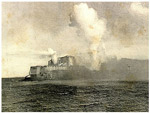The Quebec Act
This iCue Mini-Documentary describes the Quebec Act, issued by British Parliament, which further agitated colonists who were still reeling from the Stamp Act.
This feature is no longer available.
This iCue Mini-Documentary describes the Quebec Act, issued by British Parliament, which further agitated colonists who were still reeling from the Stamp Act.
This feature is no longer available.
This iCue Mini-documentary introduces the Spanish explorers Vasco Nunez del Balboa, Hernán Cortés and Francisco Pizarro's, who ventured across the Atlantic two decades after Columbus's famous voyages. The Spanish often used savage tactics to subdue Indian tribes and steal their wealth.
This feature is no longer available.
The seminar will explore the lived experience of ordinary Americans during the colonial period of history. Topics will include family and household, community organization, making a living, religious belief and practice, witchcraft and magic, and shared patterns of human psychology. Material culture will also receive considerable emphasis: domestic architecture, furnishings, and the natural environment. Mornings will be devoted to lectures and discussion; afternoons to field trips and library work.
This iCue Mini Documentary introduces Anne Hutchinson, an extreme Separatist who threatened to split the Puritan community in Massachusetts by preaching that some people are preordained. She was eventually driven out of Massachusetts to Rhode Island.
This feature is no longer available.
This iCue Mini-Documentary describes the English Puritans search for a place to practice their religion freely. They settled and eventually thrived in present-day Massachusetts, but they suffered the hardships of building a new colony.
This feature is no longer available.
This iCue Mini-Documentary introduces Maryland's establishment when King Charles I granted the land to Lord Baltimore, a devout Catholic. His appointment angered the Protestant population already settled in Maryland.
This feature is no longer available.
Francis J. Bremer, author of the biography John Winthrop: America's Forgotten Founding Father, traces the life of John Winthrop, first governor of the Massachusetts Bay Colony.
No lectures listed for Francis J. Bremer. Material has been removed.
This iCue Mini-Documentary describes the departure of a group of Puritan Separatists from England aboard the Mayflower to settle a colony in America. In Plymouth, MA, they signed the Mayflower Compact, promising that all decisions of the new colony would be made by the majority.
This feature is no longer available.

Visitors to this site will find more than 1,000 images and dozens of videos about the history and culture of Puerto Rico. The work of dozens of scholars and contributors, the Puerto Rico Encyclopedia reflects the diverse nature of the island: a U.S. territory, a key location for trade in the Caribbean, a Spanish-speaking entity with its own distinct culture, and a part of a larger Atlantic world. Funded by an endowment from the National Endowment for the Humanities and the Fundación Angel Ramos, the site is a key product from the Fundación Puertorriqueña de las Humanidades. It provides users with all content in both English and Spanish. Educators will find the site easy to navigate and conveniently categorized by themes; within each topic, appropriate subtopics provide an in-depth examination of Puerto Rican culture and history. Of particular interest to U.S. History teachers are the images and information found under History and Archeology. Here, teachers and students can explore a chronological narrative of the island's history and role at specific moments in U.S. and Atlantic history. Other sections worth exploring are Archeology (for its focus on Native American culture), Puerto Rican Diaspora (for its look at Puerto Ricans in the U.S.), and Government (for a detailed history on Puerto Rico's unique status as a free and associated US territory). Educators in other social science courses will also find valuable information related to music, population, health, education, and local government. In all, 15 sections and 71 subsections provide a thorough examination of Puerto Rico. The Puerto Rico Encyclopedia's bilingual presentation also makes it a good site for integrating Hispanic culture into the U.S. History curriculum, as well as helping to bridge curriculum for English Language Learners (ELLs) in the classroom.